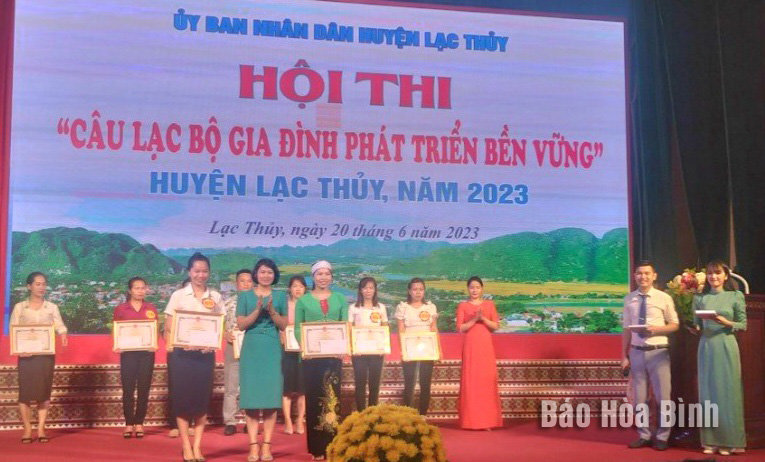
Hoa Binh has set a target to have 70% of the total households in the province registered to implement a code of conduct for behaviours in the family, contributing effectively to the implementation of the National Family Development Strategy by 2030 in the locality.
The code of conduct with four basic principles of respect, equality, love, and sharing, was issued by the Ministry of Culture, Sports and Tourism on January 28, 2022. The provincial People’s Committee and Department of Culture, Sports and Tourism issued plans in August 2022 on the implementation of the code of conduct in the locality to 2025.
The contest "Sustainable family club” in Lac Thuy district in 2023.
Nguyen Thi Anh from the provincial Department of Culture, Sports and Tourism said the province will promote the application of the code of conduct with Vietnamese moral standards and fine traditional cultural values in the period of industrialisation, modernisation and international integration, and at the same time, upholding the morality and responsibility of each person towards themselves, their family, and the community, contributing to preventing moral degradation in the family and society.
The local authorities have encouraged the participation of various sectors and the local community through diverse forms in line with reality and in connection with the functions and responsibilities of each agency and unit, towards achieving the set goals and objectives, she said.
The provincial Department of Culture, Sports, and Tourism has directed the organisation of activities commemorating the 10th anniversary of the UN International Day of Happiness (March 20, 2013 - 2023), the International Day of Families (May 15), the Vietnamese Family Day (June 28), and the National Action Month against Domestic Violence.
The province has paid due attention to children protection, gender equality and women's advancement while increasing relevant communication activities and promoting collaboration between families, schools, and society in ethics and lifestyle education, and orienting the value and behavior culture for young people, Anh went on.
Hoa Binh province is undergoing a dynamic transformation amid Vietnam’s national digital transition. Building on Poliburo’s Resolution No. 57-NQ/TW on breakthroughs in science, technology, innovation, and national digital transformation, the province has rolled out a wide range of practical action plans. A standout initiative is the "Digital Literacy for All” movement, an effort to ensure that no one is left behind in the digital era.
Hoa Binh province is undergoing a dynamic transformation in the wake of the national digital transformation movement. Building on Resolution No. 57-NQ/TW of the Politburo on breakthroughs in science, technology, innovation, and national digital transformation, the province has implemented a wide range of practical action plans. A standout initiative is the "Digital Literacy for All” movement ambitious effort to ensure that no one is left behind in the digital age.
With a spirit of unity and proactive problem-solving, the Party Committee, the government and the people of Dong Lai Commune (Tan Lac District) have made great strides in implementing the resolutions of the 24th Party Congress of the commune for the 2020 - 2025 term. Focusing on leadership and practical actions, the commune has brought the Party’s resolutions into daily life, creating strong impacts and pushing the local development forward.
Amid the nationwide push for digital transformation, young people in Hoa Binh Province are stepping up as dynamic pioneers, applying technology to enhance Youth Union operations and expand the reach of youth-led initiatives. Through creativity and adaptability, Youth Union organizations at all levels have introduced a series of practical solutions, contributing to modern governance and community development.
In recent years, An Nghia commune, located in Lac Son district, has stepped up administrative reform, focusing on improving the quality and efficiency of its single-window service unit for receiving and processing administrative procedures. These improvements have helped create favourable conditions for local residents and organisations to handle administrative procedures, contributing to the commune’s broader socio-economic development.
The Prime Minister-approved master plan to develop the multi-use value of forests ecosystems through 2030, with a vision to 2050, aims to improve the management and sustainable use of forest resources, create jobs, increase incomes, and improve the living standards of ethnic minorities, people in mountainous and remote areas, forest workers and those living near forests.



